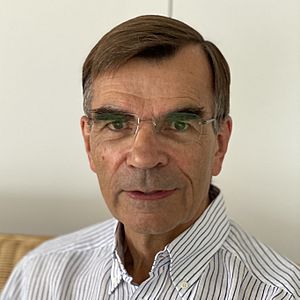Steve Young (software engineer) facts for kids
Quick facts for kids
Steve Young
|
|
|---|---|
 |
|
| Born |
Stephen John Young
1951 (age 74–75) |
| Alma mater | University of Cambridge |
| Known for |
|
| Scientific career | |
| Fields |
|
| Institutions | |
| Thesis | Speech synthesis from concept with applications to speech output from systems (1978) |
| Doctoral advisor | Frank Fallside |
Stephen John Young (born in 1951) is a British researcher and professor. He teaches Information Engineering at the University of Cambridge. He is also a successful entrepreneur. Professor Young is known for being one of the first people to work on making computers understand and talk like humans. He helped create the technology behind voice assistants.
From 2009 to 2015, he was a Senior Pro-Vice-Chancellor at the University of Cambridge. This means he helped manage the university's plans and resources. Later, from 2015 to 2019, he worked with Apple as part of the team that developed Siri.
Early Life and Education
Stephen Young was born in Liverpool, UK, on January 23, 1951. He went to the University of Cambridge for his studies. In 1973, he earned a degree in Electrical Sciences. He then continued his studies and received his PhD in speech recognition in 1978. His supervisor, Professor Frank Fallside, guided his research at the Engineering Department.
Before becoming a professor at Cambridge, he taught at both Manchester and Cambridge universities. In 1994, he became the Chair of Information Engineering at Cambridge University.
Research and Academic Career
Professor Young is famous for being the main creator of the HTK toolkit. This is a special software program that helps computers understand speech. It uses a method called "hidden Markov models" to process sounds over time. He first developed the HTK toolkit in 1989 at the Cambridge University Engineering Department.
The HTK toolkit became very popular around the world. Later, Microsoft bought a company that distributed it. Microsoft then allowed the University of Cambridge to use the software again. The HTK book, which explains how to use the toolkit, has been referenced by many other researchers.
In the late 1990s, Professor Young started focusing on how to make computers have smart conversations. He worked on creating "statistical spoken dialogue systems." His most important idea in this area was the POMDP framework. This framework helps computers manage conversations even when they don't have all the information. It made voice systems much better at understanding and responding to people.
His research also focused on making these systems work well even with noisy speech. He wanted them to learn and improve as they talked to real users. More recently, his team has used "deep learning" techniques. These are advanced computer methods that help dialogue systems learn from huge amounts of data. His team has won many awards for their work in this field.
Entrepreneurship
Besides his work as a professor and researcher, Stephen Young is also a successful entrepreneur. He played a key role in three companies that were bought by larger tech companies:
- Entropic: This company created software that helped people use their voices to control websites on mobile phones. Microsoft bought Entropic in 1999.
- Phonetic Arts: This company developed technology to make computer-generated speech sound more natural. It allowed computer games to have characters speak with different voices and emotions. Google bought Phonetic Arts in 2010.
- VocalIQ: This company built a special platform for voice interfaces. It helped businesses add voice control to their mobile apps and devices. Apple bought VocalIQ in 2015.
Awards and Honours
Professor Young has received many important awards and honours for his work. He is a Fellow of several prestigious organizations, including the Royal Academy of Engineering and the Institute of Electrical and Electronics Engineers (IEEE).
He received the IEEE Signal Processing Society Technical Achievement Award in 2004. In 2010, he was given the ISCA Medal for Scientific Achievement. He also received the European Signal Processing Society Individual Technical Achievement Award in 2013. Other awards include the IEEE James L. Flanagan Speech and Audio Processing Award in 2015 and the IEEE Carl Friedrich Gauss Education Award in 2021.
In 2020, he was elected a Fellow of the Royal Society (FRS). This is a very high honour for scientists in the UK.
In 2022, Professor Young was appointed Commander of the Order of the British Empire (CBE). This award recognized his important contributions to software engineering.

